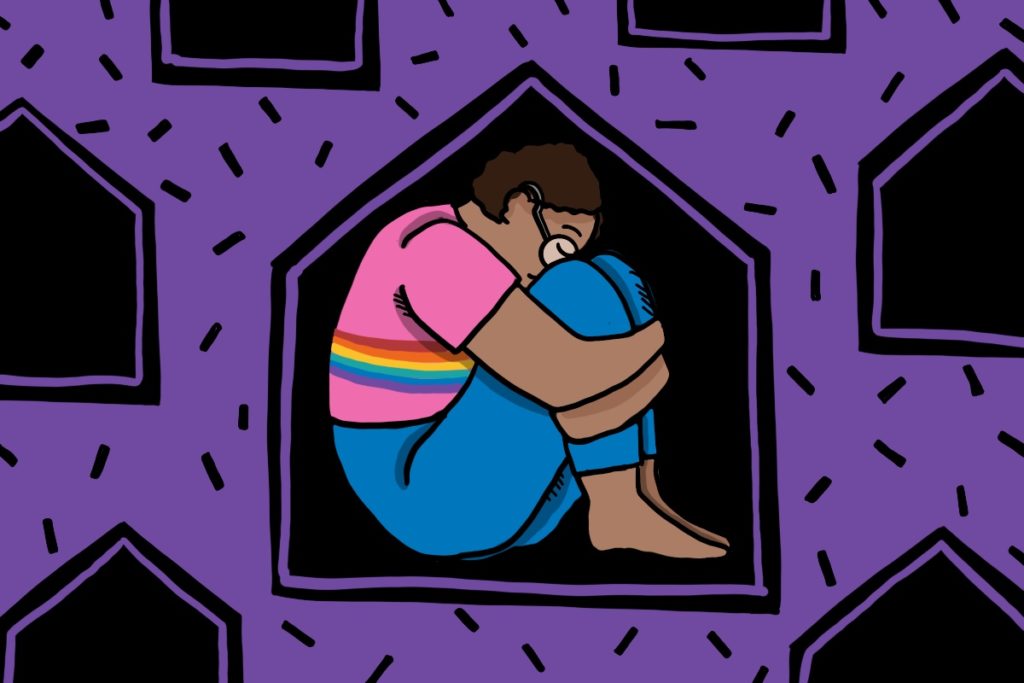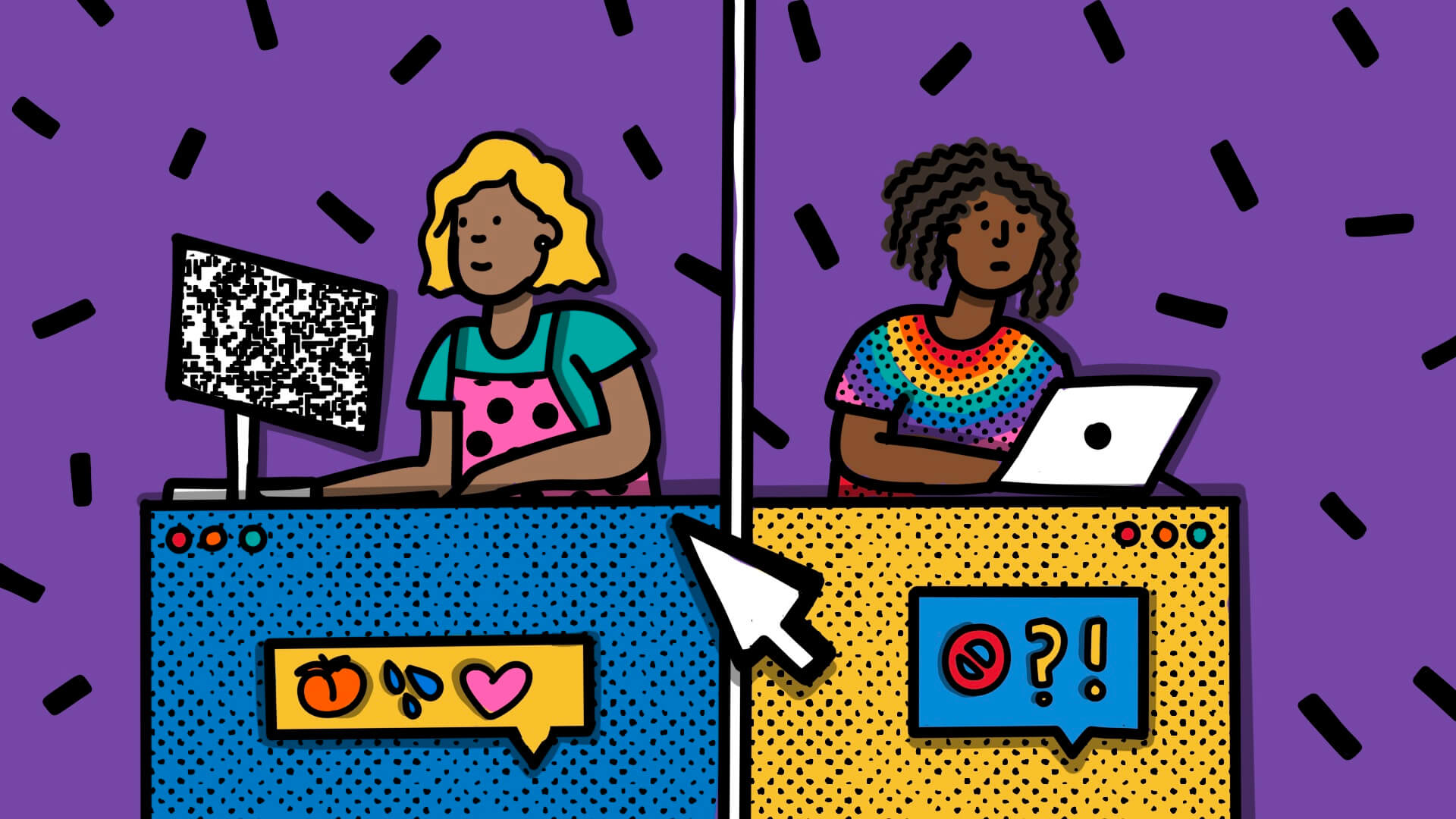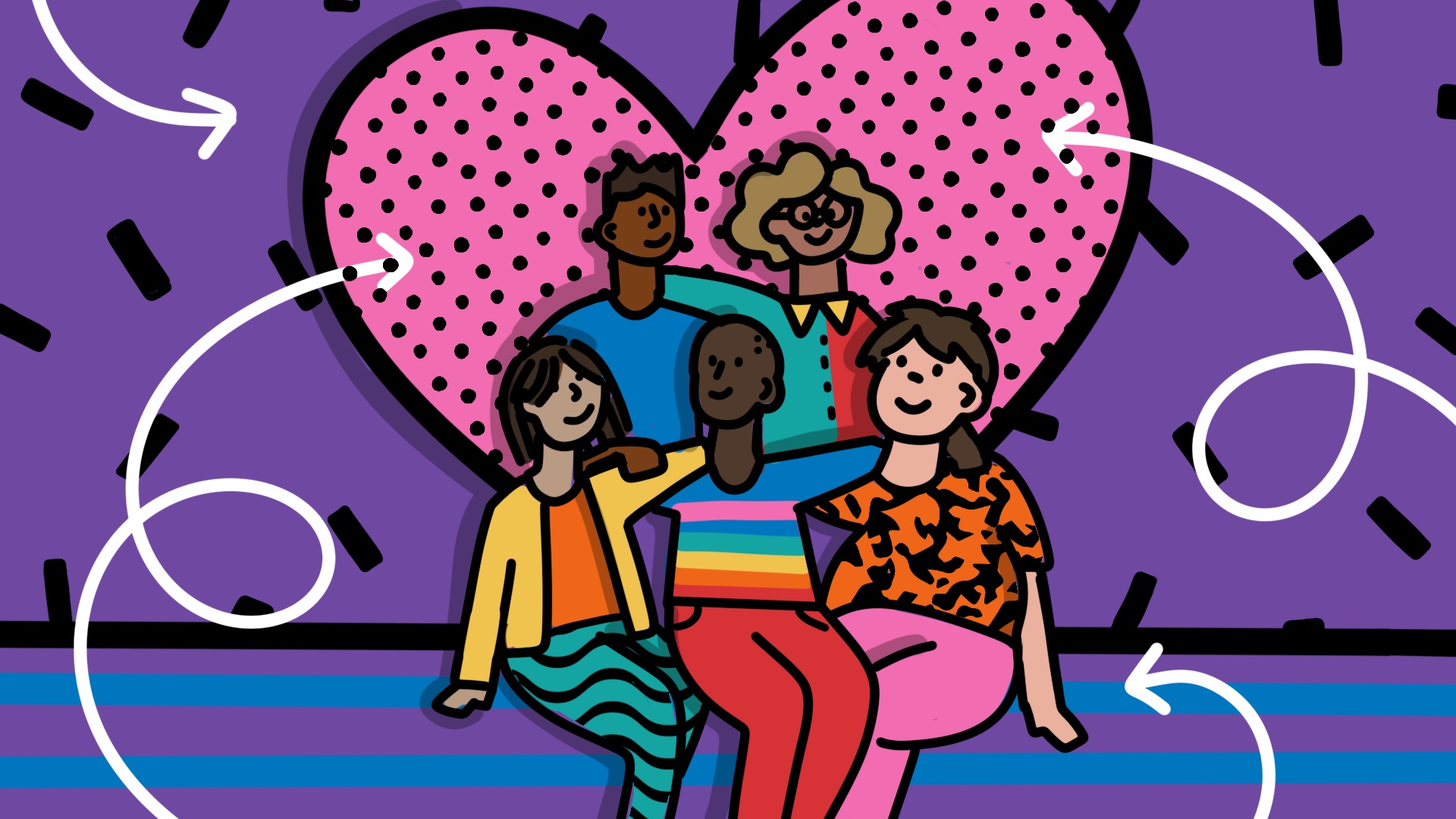
Illustration by Soofiya
Queeries: how do I survive loneliness and learn to lean into it?
During a time where absolutely everything is in hysterical and unpredictable flux, Fagony aunt Aisha Mirza considers how to get through feeling desperately lonely.
Aisha Mirza
11 Jan 2021
Dear Fagony Aunt,
I always thought of loneliness as something that would never be an issue for me. I’ve always enjoyed my own company and been comfortable with long periods on my own. During quarantine I learned the fog of loneliness can come for you any time, no matter how prepared you are. I feel like I am marooned on a planet, bereft of life. Just wandering over deserts looking desperately for anything to connect with – anything outside of myself. There’s this gnawing pain of feeling so much space around me – that I might just drift away any moment, never to be heard from again.
It’s very hard to see a way out of this desperate loneliness and I’m struggling to lean into it even though that seems like the only option I have. Any leads on how to do this, or like, get through the everyday with no sense of connection and little love (self or otherwise)?
Yours,
Scared of Lonely
Dear SoL,
Thank you so much for letting me in on your pain – for being so honest and vulnerable about a feeling that many experience but is often so hard to express out loud. I know I’m not the only one who appreciates it, especially during this, the most wonderful time of the year.
The pandemic has seen us forcibly isolated from friends, family, community, rituals and spaces that help us feel safe, seen and connected in the world. The separations we have endured this year are multi-faceted and vast, spanning from bereavement and sickness to travel restrictions and deportations, to care homes on lock, hospital stays alone and literal self-isolation. Gone are the days of enthusiastically playing shit games on Houseparty and waiting for all of “this” to be over.
Now we all know someone who has been sick, quarantining is the norm and though we miss them, communicating with our loved ones can feel like a battle against screen fatigue, depression and feeling like we have nothing to say. This year has put tremendous strain on us and everyone we know and usually rely on for comfort, attention and love. Many of us have experienced loneliness to some degree or other, and you don’t need to be Ricky Martin ft. Christina Aguilera to know that nobody wants to be lonely.
“Try to trust that, like most things, loneliness comes and goes”
It’s helpful to remember that loneliness is not the same thing as being alone. Of course they’re in relationship with each other, but not everyone who spends a lot of time alone is lonesome and not every queen of the party feels perfectly abundant all the time. Yes, you can be surrounded by people and feel lonely (we’ve all felt lonely at a party… right??) Yes, you can feel lonely in some areas of your life and not others. Yes, you can be an introvert and be lonely. I think it’s more about the quality of those connections, whether you feel held, understood, excited and soothed by them. Whether you can truly relax into them with all of the pieces of yourself; your sexuality, your mental health, the colour of the trauma you’re carrying, your bad jokes. Loneliness can be a way of admitting to ourselves that something is missing, and in that way I try to admire it for its honesty, for it’s emotional aliveness, and ask it, “ok, fine, what do you need?”
Loneliness definitely existed before 2020, especially for marginalised people; those with chronic pain, the ancestrally alienated, mental illness gang, diaspora poets and queer and trans people all for whom in many ways existence is inherently lonely (“I’m so lonely, I’m Mr. Lonely, I have nobody for my own”).
Finding safe and meaningful connection in Babylon has huge barriers. But during a time where absolutely everything is in hysterical and unpredictable flux, it makes so much sense that profound loneliness would have found a home in so many of us. While it might feel alarming for you, as someone who has previously enjoyed much time on your own, try to trust that like most things loneliness comes and goes, even if for a minute, and the fact you have some previous experience of feeling content and held will aid your return to a less trying state, no doubt.
“Please, please help yourself remember that the way you’re feeling is not your fault and that asking for help is not a burden”
Something that can make loneliness particularly difficult to sit with is the cute way it throuples up with depression and shame, leaving you in a state of paralysing self-hatred, vulnerable to internalising the cruel belief that you are in some way to blame for feeling lonely (unlovable, boring, ugly). This in turn makes it even harder to talk about, to reach out for help, or to feel worthy of any support you do get. At a time when so many people are struggling, it’s also likely that attempts to reach out may not be met with the action you need, thus reinforcing the idea that you’re unworthy in some way.
Trust that the way you’re feeling is not your fault, that loneliness is a common and natural part of the human condition, and that asking for help is not a burden. We’ve all been socialised into intense individualistic capitalism which teaches us to be “independent”, to survive on our own in little hetero snow globes and to essentially crush everyone else for the benefit of a tiny corrupt few.
But we can’t (and shouldn’t) do everything on our own. The juxtaposition of trying to survive in a system that makes no space for communality outside of productivity while also being a homo sapien who simply needs connection of some description to thrive is very jarring indeed! Some of what you’re feeling is a much bigger problem outside of us, and reminding ourselves of this gently may help to find clarity in moments where you might otherwise turn on yourself.
You’re probably not going to love this, because when you’re in the depths of loneliness this kind of thing can feel really frustrating and trite to hear, but one of the ways around loneliness is definitely through it. Though it may feel counterintuitive, it’s beneficial to get to know your loneliness as best you can. Yes, it will pass, but we are afforded more agency than that, and if we want to, hard as it is, we can try to accept loneliness without judging it or ourselves – see it through, accompany it, sit with it. It can be a valuable, and indeed special place. Getting a good therapist can really, really help.
“I think, though it may feel counterintuitive, it might be beneficial to get to know your loneliness as best as you can”
When I asked people on social media how they sit with and survive their loneliness, I got the largest and most enthusiastic response I ever have received to any question I have asked, which I share with you in the hope that it feels heartening to know there are so many people around who are asking these questions and who, instigated by your vulnerability, are beginning to piece together answers. Responses included: get a pet; hang out with kids; work out what you like doing, find other people who like doing it and do that thing with those people. Push against any fear or stigma you might have of doing things alone – go to the cinema, take yourself for lunch or an online class – events where you don’t actually have to talk to anyone but you’re still in the company of others. Meditate on the way you’re feeling; get to know nature whatever that looks like for you; have baths; warm lighting; read; listen to music or podcasts; touch yourself; get a maternity pillow; volunteer (and more).
For me, loneliness is very closely tied to depression and one will often summon the other. Through years of practice, I am able to claim this about myself, though it doesn’t make the reality of it much easier to bear. Something that has helped me in difficult moments is writing a list of people I trust and who love me and keeping it by my bed, ready for the moment I wake up at 5 am feeling completely, utterly hopeless and alone.
Something else I find soothing is the possibility of creating community out of these painful and shameful emotions (as the founder of a rave for chronic depressives, I am a firm believer that you can build community out of anything). Perhaps reading books, listening to podcasts or starting conversations about loneliness with friends or strangers could help you feel less lonely in your loneliness?
Sometimes all of this is too much though, and boy do I respect that. Sometimes you feel weak! You don’t want any of it! You can’t see a way out of it! And that’s so valid too. Stay in bed, ignore your emails, watch the show about the skinny white girl, drink the wine, do the porn, grit your teeth and wait for the intensity of this feeling to diminish. Do whatever you need to do to ease yourself through these difficult days, but know that you will move on from them when it’s time. Run from the idea that we should strive to be happy, excellent, thriving, self-loving, full-potential-meeting people all the time. It’s a trap! We are allowed to be wounded, ugly and unhappy. We are allowed to be lonely.
Anyone thinking about suicide can revist my column “Is it wrong to think about killing myself?” (resources/phone lines at the bottom)
Resources
Tips to manage loneliness from Mind
Crowd-sourced ideas on how to survive loneliness
Collection of online lockdown events
The Lonely City: Adventures in the art of being alone by Olivia Laing
Don’t Let Me Be Lonely by Claudia Rankine
Winter Support Hub by Sabah Choudrey
Misery: a mental health collective for QTIBPOC Flock: birdwatching for BPOC





